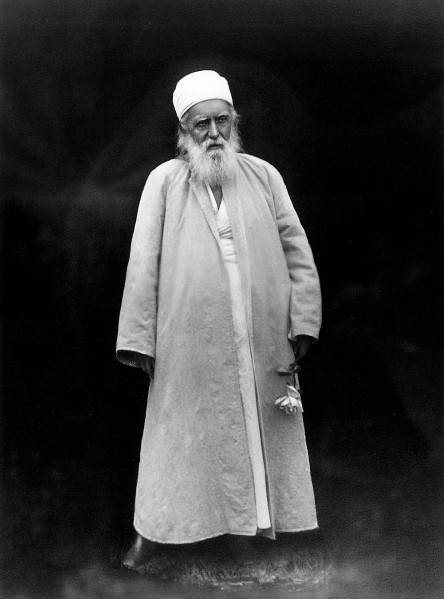The Significance of ‘Abdu’l-Bahá’s Journey to the West
It has been mentioned in an earlier article that the prime motive behind ‘Abdu’l-Bahá’s journey was His desire to consolidate the efforts of the Bahá’ís of the western hemisphere. But what His journey revealed, as we shall see later as we follow His movements, transcended the limits of the meaning of consolidation.
He had in the past received many invitations from the Bahá’ís in the United States soliciting His coming with insistence. How impossible it was for a prisoner of a tyrannous sultan to cross over the walls enclosing Him, let alone to traverse to the northwestern end of the globe!

'Abdu'l-Bahá in a portrait taken 3 May 1912 at Lincoln Park, Chicago (Reproduced with permission of the Bahá'í International Community)
During the three years of His journey, this distinguished Prisoner never weakened His pace, never wearied in pursuing His efforts to consolidate those forces that would, fixed step by fixed step, purposively change the world during the coming years and centuries. The outright change for which ‘Abdu’l-Bahá drew the plan must ripen in the minds of people, strike roots in their consciences, before it yield the desired results. Therefore, our early evaluation of the significance of the effects of His journey, of the concepts, principles and warnings proclaimed by ‘Abdu’l-Bahá in public pulpits and in private gatherings throughout His travels will afford us only a glimmer of the true significance of His noble Project. But no matter how limited our present perception may be of the future effects of the proclamation made during this journey on world affairs (as on the spirit of the individual), our celebration of the first centenary of this event will be meaningless without us exerting an effort, no matter how humble, to disclose ‘Abdu’l-Bahá’s role in drawing to the attention of the world’s leaders the necessity of applying new principles and values, as well as new standards, in accordance with the unparalleled change which has occurred on this planet.
Finally, and after some fifty years since the time of Bahá’u’lláh’s announcement of His divine message, His son was able to explain and detail its teachings directly to the public and to their political and religious leaders, and at the same time present to them the solutions these teachings provide for the problems and crises that threaten the future of humanity.
There is no doubt that the talks of ‘Abdu’l-Bahá and His explanations broadened the horizons of His listeners and brought them to new spiritual vistas; and that they are still gradually correcting the understanding of religions, and rectifying political outlooks, as well as spiritualizing the materialistic thinking of the inhabitants of the West; that from there their influence will spread throughout the other parts of the world.
The matter we would like to focus on at present relates to the events of His visit to Egypt. From the time of His arrival in that land, which He chose for the recovery of His health and to renew His energy during the intervals between the various stages of His journey, and throughout the duration of His residency there, He did not give any public talks. He contented Himself with receiving visitors in His private residence in Raml in Alexandria. Despite this, His presence attracted the attention of many Egyptian political leaders, leaders of thought, writers, journalists and clergy, who hastened to pay Him their respects. The news items and articles that were published by His visitors and reporters from various journals were like a proclamation of the Bahá’í Faith, and laid upon those who became aware of it the responsibility to continue investigating its teachings and purpose.